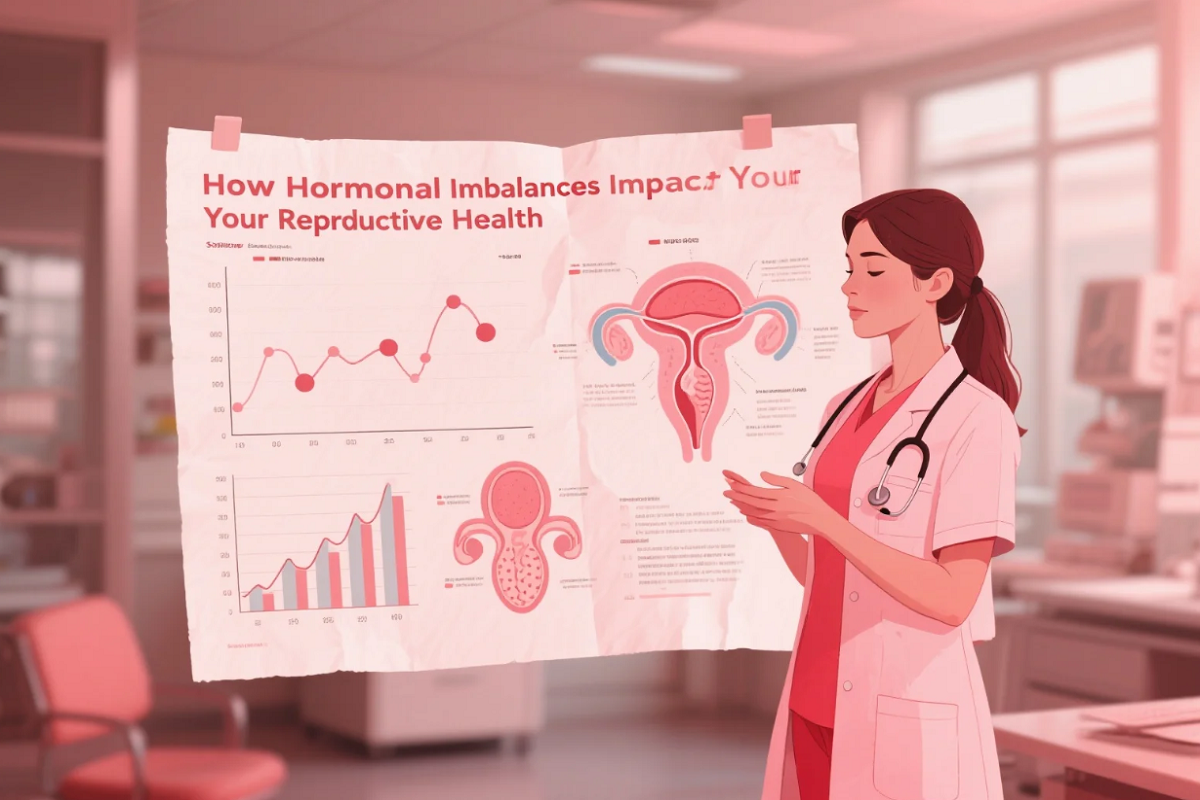How Hormonal Imbalances Impact Your Reproductive Health
-
20
- 20 Oct, 2025

Hormones play a crucial role in our bodies, affecting everything from mood and energy to metabolism and reproductive health. But what happens when these hormones get out of balance? For many individuals, hormonal imbalances can significantly impact reproductive health, often leading to a range of issues that can be both physical and emotional. Whether you're dealing with irregular periods, difficulty conceiving, or other reproductive concerns, understanding the effects of hormonal imbalances is essential for taking control of your health.
In this article, we’ll explore how hormonal imbalances impact reproductive health, the signs to look for, and how to manage these imbalances to maintain overall well-being.
What Are Hormones and Why Are They Important?
Hormones are chemical messengers produced by various glands in the body, including the thyroid, adrenals, and gonads (ovaries and testes). They play a crucial role in managing various bodily functions, such as:
- Metabolism
- Mood
- Growth and development
- Sexual function
- Reproduction
In terms of reproductive health, hormones such as estrogen, progesterone, testosterone, and luteinizing hormone (LH) work together to regulate the menstrual cycle, pregnancy, and even sexual desire. An imbalance in any of these hormones can disrupt these processes, leading to health concerns.
The Connection Between Hormonal Imbalances and Reproductive Health
Irregular Periods and Ovulation
One of the most common signs of hormonal imbalance in women is irregular periods. A balanced cycle usually lasts between 21 to 35 days, but hormonal imbalances can lead to cycles that are longer, shorter, or more unpredictable.
- Estrogen imbalance: If estrogen levels are too high or too low, it can cause anovulation (lack of ovulation), making it difficult to predict when a woman will ovulate.
- Progesterone deficiency: Progesterone helps regulate the menstrual cycle, and a deficiency can result in heavier or lighter periods, longer cycles, or spotting between periods.
In addition to irregular cycles, hormonal imbalances can cause more severe conditions such as polycystic ovary syndrome (PCOS), which is closely related to insulin resistance and excess androgens (male hormones like testosterone). Women with PCOS may have long, irregular cycles or fail to ovulate altogether.
Infertility and Difficulty Conceiving
Infertility is one of the most emotionally and physically taxing outcomes of hormonal imbalances. Hormonal fluctuations can interfere with the ability to conceive in several ways:
- Luteal phase defect: This occurs when progesterone levels are too low to support the early stages of pregnancy, leading to miscarriage or an inability to maintain a pregnancy.
- Polycystic ovary syndrome (PCOS): Women with PCOS may have elevated levels of testosterone, preventing regular ovulation and making conception more challenging.
- Thyroid imbalances: An overactive or underactive thyroid can interfere with ovulation and disrupt the regularity of the menstrual cycle, leading to issues with conception.
Impact on Pregnancy
Hormonal imbalances can also cause complications during pregnancy. For instance, low progesterone levels can contribute to early pregnancy loss, while high levels of estrogen may result in gestational diabetes or preeclampsia.
Women with hypothyroidism (low thyroid hormone levels) or hyperthyroidism (high thyroid hormone levels) may also experience complications, as these conditions can affect the baby’s development, particularly in the early stages of pregnancy.
Polycystic Ovary Syndrome (PCOS)
PCOS is a prevalent hormonal condition that impacts many women during their reproductive years. It is characterized by an imbalance in androgen (male hormones like testosterone), which can lead to irregular periods, infertility, and other health problems like acne, weight gain, and excessive hair growth. The hormonal imbalance in PCOS can also increase the risk of developing type 2 diabetes, high cholesterol, and heart disease.
For women with PCOS, managing the hormonal imbalance often involves lifestyle changes, medications like birth control to regulate periods, or metformin to manage insulin resistance.
Menopause and Hormonal Changes
For women approaching menopause, hormonal imbalances are a natural part of aging. The ovaries gradually produce less estrogen and progesterone, leading to symptoms such as hot flashes, night sweats, and vaginal dryness. The hormonal shift can also affect menstrual cycles, leading to irregular periods and, eventually, their cessation.
While menopause is a natural process, some women may require treatment options such as hormone replacement therapy (HRT) to manage severe symptoms. However, the decision to use HRT should be made in consultation with a healthcare provider, as there are potential risks associated with it.
How Hormonal Imbalances Affect Men’s Reproductive Health
While hormonal imbalances are more commonly associated with women, they can also impact men’s reproductive health. In men, testosterone is the primary hormone responsible for sperm production, libido, and muscle mass. A testosterone imbalance can cause a range of issues, including:
- Low libido
- Erectile dysfunction
- Infertility
- Loss of muscle mass
- Depression or mood swings
Testosterone levels naturally decline with age, but other factors such as stress, obesity, and medical conditions like hypogonadism (low testosterone production) can also contribute to these imbalances. Treatment options for men with low testosterone include testosterone replacement therapy (TRT), but again, this should be carefully managed by a healthcare provider.
Symptoms of Hormonal Imbalances to Watch For
If you suspect that a hormonal imbalance is affecting your reproductive health, it’s important to watch for common symptoms. These may include:
- Irregular or absent periods
- Heavy or light menstrual flow
- Trouble conceiving or infertility
- Severe acne or oily skin
- Weight gain or difficulty losing weight
- Fatigue, mood swings, or depression
- Excessive hair growth or thinning hair
- Hot flashes or night sweats
- Painful intercourse or vaginal dryness
- Erectile dysfunction or low libido in men
If you experience any of these symptoms, it’s essential to consult with a healthcare provider who can help diagnose the root cause and recommend appropriate treatment.
Managing Hormonal Imbalances
Managing hormonal imbalances involves both lifestyle changes and medical treatments. Here are some strategies that may help:
1. Healthy Diet and Exercise
Eating a balanced diet rich in nutrients like vitamins D and B12, omega-3 fatty acids, and magnesium can support hormonal health. Regular exercise helps reduce stress (which can negatively affect hormones) and maintain a healthy weight.
2. Stress Management
Ongoing stress can disrupt cortisol levels, the "stress hormone," potentially affecting the balance of reproductive hormones. Techniques like yoga, meditation, and mindfulness can help manage stress.
3. Medications and Hormone Therapy
In some cases, medications such as birth control pills, metformin (for PCOS), or hormone replacement therapy (HRT) may be necessary to regulate hormonal levels. A healthcare provider can determine the most appropriate course of treatment.
4. Supplements
Some individuals find relief from certain symptoms of hormonal imbalance with supplements like vitex, maca root, or DIM (diindolylmethane). However, it’s crucial to speak with a healthcare provider before starting any supplement regimen.
Hormonal imbalances can have a significant impact on reproductive health, affecting everything from menstrual cycles to fertility and pregnancy. Understanding the underlying causes of these imbalances and seeking appropriate treatment can help individuals maintain a balanced and healthy reproductive system. Whether through lifestyle changes, medication, or hormone therapy, managing hormonal health is essential for overall well-being.
If you're experiencing symptoms related to hormonal imbalances, don’t hesitate to consult with a healthcare provider who can help you navigate the best path toward balance and health.
Key Takeaways:
- Hormonal imbalances can cause a variety of issues, from irregular periods to infertility.
- Both women and men can experience hormonal disruptions, leading to reproductive health problems.
- Treatment may involve lifestyle changes, medications, and sometimes hormonal therapies.
- Monitoring and maintaining hormonal health is key to overall well-being.
By understanding and addressing hormonal imbalances, you can take control of your reproductive health and improve your quality of life.










